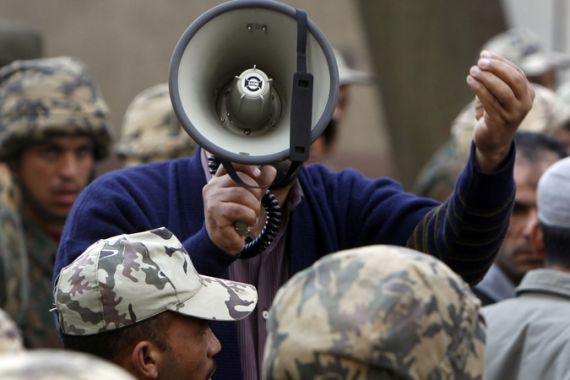Egyptian state security disbanded
Interior minister disbands country’s hated state security agency, which was accused of torture and human rights abuses.

 |
| Protesters stormed several state security buildings earlier this month, in a bid to expose officials documents [Reuters] |
Egypt’s interior minister has disbanded the country’s feared state security agency, which was accused of torture and human rights abuses during the 30-year rule of former president Hosni Mubarak.
Major General Mansour el-Essawy, a former Cairo security chief and the new interior minister, announced the dissolution of the security apparatus in a statement on Tuesday.
He said a new agency in charge of keeping national security and combatting terrorism will be formed “in line with the constitution and principles of human rights”.
Officers for the new agency will be chosen in the coming few days, the statement said, adding that the new agency will “serve the country without intervening in the lives of citizens while they practice their rights and political life”.
The move meets one of the main demands of activists who led an 18-day uprising against Mubarak, who stepped down on February 11.
The security branch, which was empowered to conduct emergency trials, was widely hated and its officers accused of committing torture.
‘Hated police force’
The move was announced as Hillary Clinton, the US secretary of state, visited the capital, Cairo in a bid to lend support to Egypt during its transition.
|
|
Speaking at a joint news conference with the Egyptian foreign minister Nabil Elaraby during a visit to Cairo on Tuesday, Clinton welcomed the announcment.
Al Jazeera’s James Bays, reporting from Cairo, said the timing of the announcement could have been a bid to deliver good news during her visit.
But he said the dissolution of the state security agency also came as welcome news to many Egyptians because the role of the apparatus had expanded in recent years.
“They’d become a separate police force that seemed to be involved in torture, surveillance, tapping people’s phones,” he said.
“They were able to start cases against people and then actually prosecute people and imprison people. So they were a very hated force.”
“They’ve now been replaced by a new national security agency; new staff are being recruited for that agency and we’re told it will have a more defined role.”
Powerful symbol
But he said there will be some among the pro-democracy activists who say that does not go far enough, and who would like to see prosecutions against those who were leading the old agency.
Protesters stormed several state security buildings in Egypt earlier this month, seizing documents to keep them from being destroyed to hide evidence of human rights abuses.
Many official documents were already shredded in piles or burned in what protesters believe was an attempt to hide evidence incriminating senior officials in abuses. Some also searched the building for secret detention rooms.
Egypt’s State Security Investigations (SSI), which were given a free hand by emergency laws under Mubarak, were some of the most powerful symbols of the former regime.
Many protest leaders claimed the agency remained active in protecting the old regime and trying to sabotage the revolution, despite the fall of Mubarak and his government.
